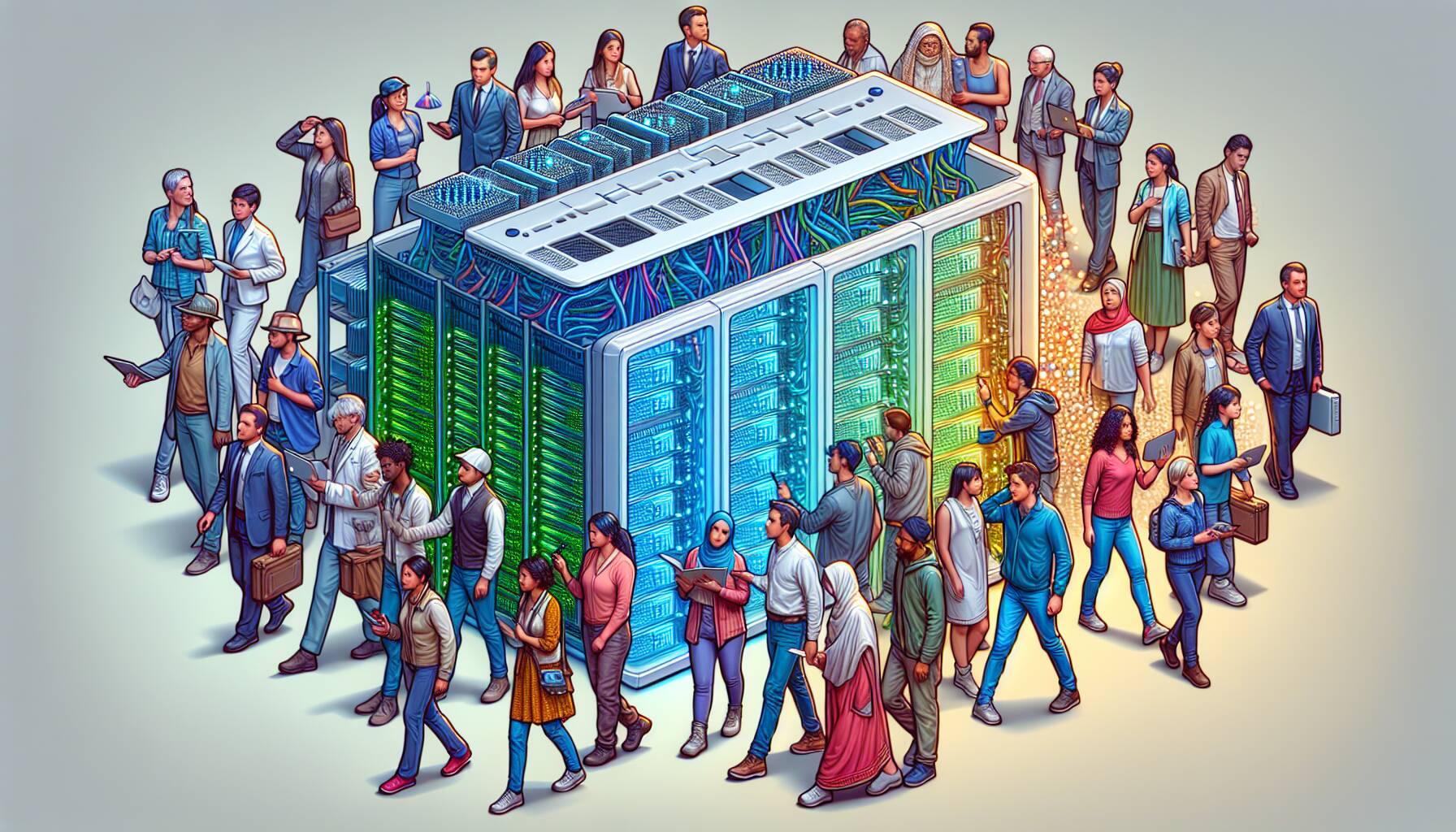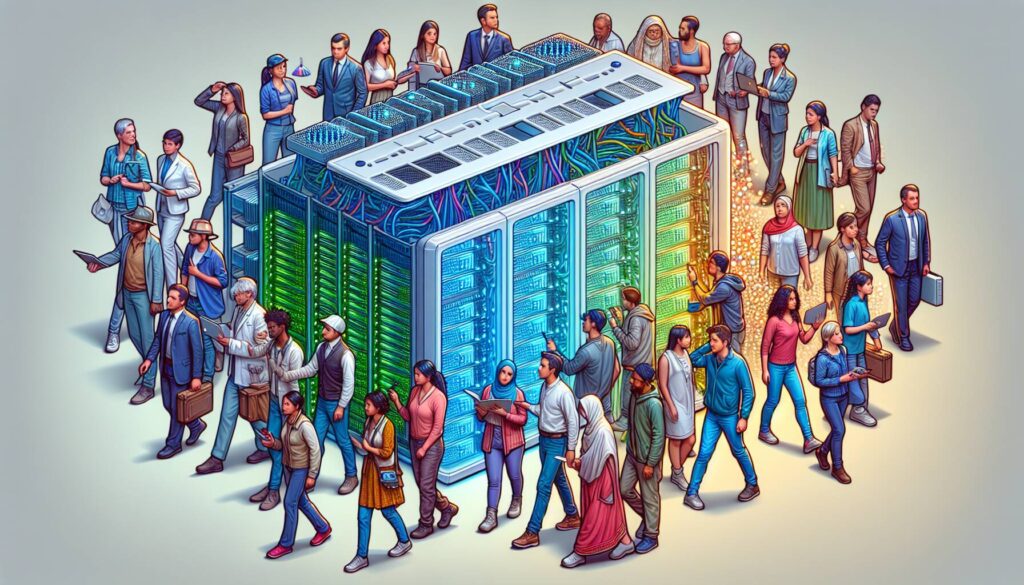In an intriguing journey from a noisy desk in a university lab to the forefront of decentralized technology, AI researcher Ben Fielding has embarked on a mission to reshape the landscape of machine learning. Back in 2015, while struggling with a cumbersome machine at Northumbria University, Fielding identified a significant challenge: the barriers posed by computational power. Understanding that huge tech companies like Google already had an upper hand in resources, he sought to democratize access to AI capabilities. Fast forward to 2020, Fielding co-founded Gensyn, a venture aimed at pioneering decentralized AI solutions.
Gensyn has recently celebrated a major milestone with the launch of its Testnet and the introduction of the “RL Swarms” protocol. This innovative framework allows multiple AI models to collaborate and improve one another’s outcomes in real-time, exemplifying the concept of “swarm intelligence.” By enabling these models to critique and learn from each other, Fielding’s vision of a cooperative and decentralized AI ecosystem is beginning to materialize.
Gensyn’s integration of blockchain technology plays a crucial role in this equation. By leveraging blockchain, the platform assures users of persistent identity and trust through decentralized ledgers—key elements necessary for a secure and efficient collaborative environment. As machines interact and share learnings, blockchain offers a programmatic way to establish trust, circumventing the need for centralized verification.
“Machine learning is heavily constrained by its core resources. This creates this huge moat for centralized AI companies, but it doesn’t need to exist,” Fielding explains, emphasizing his commitment to making AI accessible to all innovators, not just tech giants.
As Gensyn gears up for its main-net launch, the focus is on creating a system where machine learning resources are instantly available to everyone, fundamentally altering how AI can be developed and deployed across industries. With this initiative, Fielding is not just building technology; he is laying the groundwork for a future where the capabilities of AI are democratized and open-sourced, inspiring a new wave of innovation across the globe.

The Dawn of Decentralized AI: Ben Fielding’s Vision
Ben Fielding’s journey from a noisy lab desk to pioneering decentralized AI technologies highlights several important aspects of innovation and the transformative potential of AI. Here are the key points that resonate with readers:
- Noisy Beginnings:
Fielding’s early challenges with constraints illustrate that innovation often arises from difficult circumstances, impacting how individuals approach problem-solving.
- Decentralized AI Concept:
The founding of Gensyn in 2020 emphasizes the shift towards more democratized access to AI resources, which may encourage readers to consider broader ideas of access and community contribution in technology.
- RL Swarms Protocol:
This development allows AI models to critique and improve each other collaboratively, potentially changing how machine learning technologies can evolve and compete.
- Blockchain Integration:
Incorporating blockchain into AI networks establishes trust and accountability, which can have implications for secure transactions and data sharing in various sectors.
- Accessibility to Resources:
Fielding’s vision is to make machine learning resources accessible to everyone, removing barriers that prevent smaller innovators from developing technologies, thereby promoting inclusivity in tech.
- Future of AI Collaboration:
The anticipated advancements suggest a future where individuals and organizations can participate in AI development more freely, potentially leading to rapid innovation and diverse applications of AI.
- Focus on Open Source:
Championing open-source principles within AI can lead to a more equitable tech landscape, encouraging readers to engage with technology development beyond consumer roles.
Gensyn’s Decentralized AI: A Game Changer in Machine Learning Infrastructure
The emergence of Gensyn marks a significant step forward in the machine learning landscape, particularly in the realm of decentralized AI. Founded by Ben Fielding and Harry Grieve, this innovative platform captures the essence of collaborative learning through its unique “RL Swarms” protocol. Unlike traditional AI systems dominated by tech giants like Google, which operate on vast datasets and numerous GPUs in centralized locations, Gensyn offers a revolutionary approach that emphasizes decentralization and accessibility for all developers. By addressing compute constraints, Gensyn enables smaller players to participate in AI development and innovation.
Competitive Advantages: Gensyn’s architecture empowers individual users or small teams to contribute to building machine learning solutions through its RL Swarms. This collaborative model allows for cross-sharing of learning among various systems, leading to faster and more efficient improvements. Incorporating blockchain technology further enhances the integrity and trustworthiness of interactions within its ecosystem, establishing persistent identities that protect users from potential disputes. This decentralized method diminishes the control that major corporations have historically held in AI, paving the way for a democratized tech future.
Competitive Disadvantages: However, while Gensyn offers a promise of more equitable access to AI resources, it may face challenges associated with scalability and user adoption. The shift from traditional centralized systems to decentralized models can hinder immediate performance and usability at scale, posing a barrier to entry for those accustomed to well-established, easy-to-use solutions. The very essence of decentralized frameworks could lead to issues around consistency and verification if not properly managed, which might dissuade hesitant developers from fully committing to this new paradigm.
Target Audience Impacts: Gensyn’s offerings could greatly benefit startups and independent developers who lack the financial backing to invest in expansive infrastructure. This accessibility allows for innovation at multiple levels, potentially unleashing a wave of creativity across various sectors. However, the very tech giants that Gensyn aims to disrupt may see this development as a threat, prompting them to intensify their own innovations. Additionally, traditional academic institutions may face dilemmas as their foundational role in AI research could diminish with alternatives like Gensyn democratizing access to AI tools.
As Gensyn prepares for its main-net launch, it stands at the forefront of a pivotal shift in the machine learning landscape. It represents a promising alternative to established systems while remaining mindful of the challenges that come with innovation in a rapidly evolving technological environment.

















